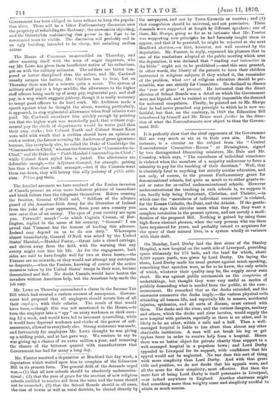Mr. Forster received a deputation at Bradford this day week,
a deputation which waited upon him to complain of the Education Bill in its present form. The general drift of the demands urged was,—(I) that all new schools should be absolutely undenomina- tional ; (2) that the year of grace for the erection of new religious schools entitled to receive aid from the rates and the taxes should not be conceded; (3) that the School Boards should in all cases, the case of towns as well as rural districts, be elected directly by the ratepayers, and not by Town Councils or vestries ; and (4) that compulsion should be universal, and not permissive. These demands were supported at length by different speakers ; one of them, Ur. Sharpe, going so far as to intimate that Mr. Forster was supporting now principles he had formerly taught them to oppose, and that if he persisted, he might be rejected at the next Bradford electiou,—a hint, however, not well received by the deputation. Mr. Forster, in reply, expressed his pleasure that in one of the resolutions adopted at the public meeting which sent the deputation, it was declared that " reading and instruction in the Bible " ought not to be prohibited ;—and this once granted, in other words, the liberty of the parents to have their children instructed in religious subjects if they wished it, the remainder of the problem, what sort of religious education should be per- missible, was one strictly for Committee. He declined to discuss the ' year of grace' at present. He intimated that the direct election of School Boards was a detail on which the Government were not bigoted, and he resisted as utterly impossible the demand for universal compulsion. Finally, he pointed out to Mr. Sharpe that be had never preached any principle to which he is now un- faithful, but that, on the contrary, in 1868 the Education Bill introduced by himself and Mr. Bruce went further in the direc- tion of what the Nonconformists now object to than the Govern- ment Bill.






























 Previous page
Previous page